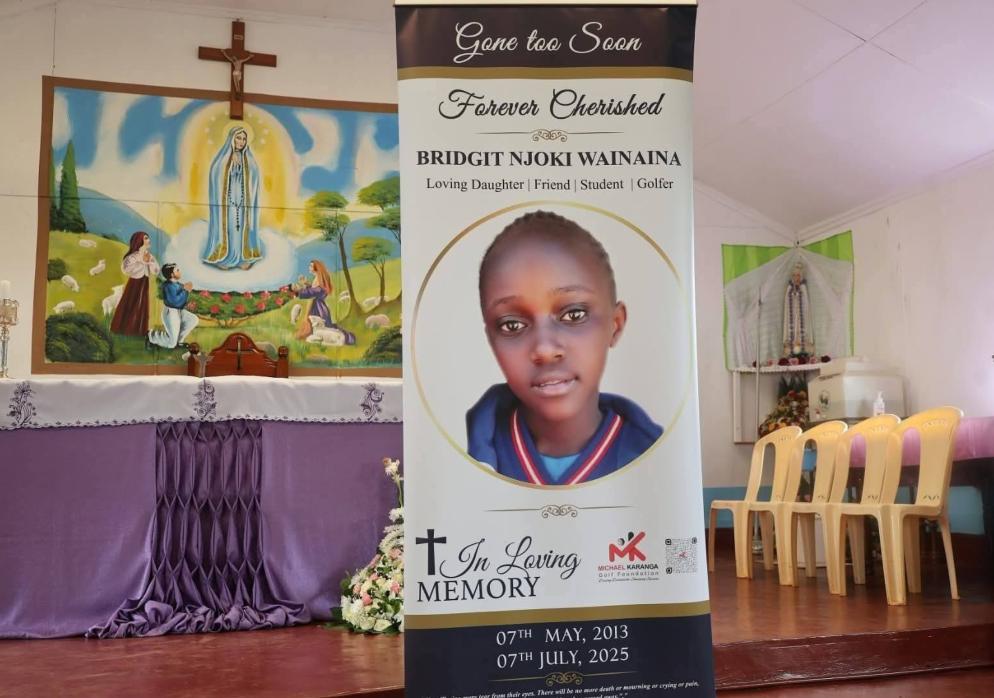 Emotions ran high in Kirigu-ini village, Ndumberi, Kiambu County during the burial of Bridget Njoki, a 12-year-old girl who was struck by a bullet while watching television at home/HANDOUT
Emotions ran high in Kirigu-ini village, Ndumberi, Kiambu County during the burial of Bridget Njoki, a 12-year-old girl who was struck by a bullet while watching television at home/HANDOUTThe Kenyan diaspora has issued an urgent appeal for calm, justice, and reform in response to the escalating violence and lawlessness witnessed in the country over recent weeks.
In a strongly worded statement, the Coalition of Diaspora Communities, representing Kenyans from North America, Europe, and other global regions, condemned the growing brutality and dysfunction.
The statement comes amid public outrage over the recent spate of deadly protests, during which multiple civilians—many of them young—were killed or injured.
Among the diaspora’s own, the pain has struck deeply: one member’s son was critically shot, while another’s granddaughter suffered a fatal injury.
“These heartbreaking events are not isolated,” the coalition stated.
“They reflect a much deeper, systemic failure of governance, accountability, and the rule of law in our homeland.”
The police impunity being witnessed in Kenya today is a consequence of reckless statements by some leaders.
“The use of excessive force by police is unacceptable and must stop with immediate effect,” said Bernard Kavyu, an official of Diaspora County 48 Kenya.
At the heart of their concern is the conduct of the police and other security organs, which the diaspora accuses of prioritising control and suppression over protection and public service.
The coalition argued that security institutions in Kenya have yet to fully transition into democratic organs guided by justice, accountability, and transparency.
“State institutions have failed to evolve. Instead, they cling to outdated and oppressive models reminiscent of colonial rule,” the statement read.
But the diaspora’s critique was not reserved for the state alone.
The coalition also took issue with the posture of certain elements within civil society, the media, opposition politicians, and protest organisers, accusing them of escalating tensions through confrontational tactics that mirror the adversarial legacy of colonial resistance movements.
“This dynamic creates a cycle of mutual antagonism that undermines peace, stability, and genuine democratic progress,” said the Kenya Diaspora Caucus, Scotland Chapter.
Rather than fueling further division, the coalition called for a collective national reset—one grounded in dialogue, accountability, and a shared responsibility to uphold human rights and democratic principles.
They urged all Kenyans, regardless of affiliation, to reflect on their role in either perpetuating or healing the nation’s deepening fractures.
“We must move beyond slogans and entrenched positions. True transformation requires every sector—government, civil society, political opposition, and citizens—to act with restraint, integrity, and a commitment to peace,” the statement said.
As a concrete step forward, the diaspora coalition demanded the immediate formation of an independent and transparent commission of inquiry to investigate all instances of police violence and abuse.
The commission, they stressed, must be fully empowered to take decisive action to end impunity and guide reforms that can transform the police into a professional, community-centered service.
“This is not just about responding to a crisis—it’s about redefining Kenya’s future. We must break the cycle of violence and restore public confidence in our institutions,” the statement urged.
They also challenged the broader public, including the media, protest organisers, and advocacy groups, to adopt more rights-based, constructive approaches to governance and dissent, arguing that protest and accountability must strengthen, not weaken, Kenya’s fragile social fabric.











